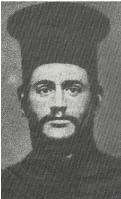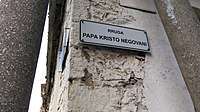Kristo Negovani
| Papa Kristo Negovani | |
|---|---|
 Picture of a young Papa Kristo Negovani | |
| Born |
1875 Negovan, now part of Florina in Greece, then Manastir Vilayet, Ottoman Empire |
| Died |
1905 (aged 30) Negovan |
| Occupation | Teacher, Priest, Publisher |
| Period | 1895–1905 |
| Literary movement | Albanian National Revival |
| Notable works | The History of the Old Testament (Albanian: Istori e Dhiatës së Vjetërë), The Destruction of Hormova (Albanian: Prishija e Hormovësë). |
Papa Kristo Negovani, born Kristo Harallambi and also known as Kristo Negovani (1875 – February 12, 1905), was an Albanian nationalist figure, religious leader and writer.[1][2][3][4][5][6]
Biography
Born in the village of Negovan, now part of Florina in Northern Greece, then Manastir Vilayet, Ottoman Empire, he pursued his secondary schooling in Athens, Greece and later emigrated to Brăila, Romania.[7] There, he came into contact with the Albanian National Revival movement and attained Albanian national sentiments.[7] In 1897, he returned to his native village and worked as a teacher and parish priest.[7]
Negovani transformed his house into a school and taught over one hundred children and adults to read and write Albanian. He preached and introduced the Albanian language for the first time in Orthodox Divine Liturgy earning the displeasure of the Greek Orthodox hierarchy.[7][8][9][10] For his efforts Negovani was murdered (February 12, 1905) by a Greek guerilla band on orders from Bishop Karavangelis of Kastoria.[9][10][4][1][5][2][3][6] Negovani's death aroused a nationalist response with the Albanian guerilla band of Bajo Topulli killing the Metropolitan of Korçë, Photios.[8][7]
Works
Negovani is the author of prose and poetry, including school texts, translations and fables. Among his publications are
- The History of the Old Testament, (Albanian: Istori e Dhiatës së Vjetërë), Bucharest 1889;
- The Destruction of Hormova, (Albanian: Prishija e Hormovësë), Sofia 1904;
- Little Dhonat Argjendi (Albanian: I vogëli Dhonat Argjendi), Costanza 1904;
- Works of the Holy Apostles (Albanian: Bëmatë të shëntorëvet dërgimtarë), Sofia 1906;
- History of Plikati (Albanian: Istorishkronjë e Plikatit), Thessaloniki 1909.
References

- 1 2 Blumi, Isa (2002). "The role of Education in the formation of Albanian identity and its myths". In Schwanders-Sievers, Stephanie; Fischer, Bernd J. Albanian Identities: Myth and History. Bloomington: Indiana University Press. p. 55. ISBN 9780253341891.
- 1 2 Bociurkiw, Bohdan R.; Strong, John W.; Laux, Jean K. (1975). Religion and atheism in the U.S.S.R. and Eastern Europe. Macmillan. p. 397. ISBN 9780333150603. "Papa Kristo Negovani... Both men were victims of Greek fanaticism, incited by their devotion to the teaching of the forbidden Albanian language."
- 1 2 Selim Islami; Kristo Frashëri; Aleks Buda (1965). Historia e Shqiperise. II. p. 274.
- 1 2 Skendi, Stavro (1967). The Albanian national awakening, 1878-1912. Princeton University Press. pp. 206–207. ISBN 9781400847761. "In the south, the Greek guerillas were active and tried to suppress the Albanian movement by persecuting its supporters. In 1905 they assassinated the Albanian priest Papa Kristo Negovani because he taught Albanian and had published books in Albanian."
- 1 2 Ramet, Sabrina P. (1988). Eastern Christianity and politics in the twentieth century. Duke University Press. p. 9. ISBN 978-0-8223-0827-0. "Not surprisingly, language has been a salient issue in Orthodox church politics. Albanian Orthodox priest Papa Kristo Negovani was killed by Greek fanatics in 1905 when he tried to promote the Albanian language in schools and introduce it into the liturgy."
- 1 2 Jašar Redžepagić (1970). Zhvillimi i arësimit dhe i sistemit shkollor të kombësisë shqiptare në teritorin e Jugosllavisë së sotme deri në vitin 1918. Enti i teksteve dhe i mjeteve mësimore i Krahinës Socialiste Autonome të Kosovës. p. 87. Retrieved 29 May 2012.
- 1 2 3 4 5 Clayer, Nathalie (2005). "Le meurtre du prêtre: Acte fondateur de la mobilisation nationaliste albanaise à l'aube de la révolution Jeune Turque [The murder of the priest: Founding act of the Albanian nationalist mobilisation on the eve of the Young Turks revolution]". Balkanologie. IX (1–2). para. 7. "Negovani... Au début de l'année 1905, avec son frère lui aussi pope et trois autres villageois, il est victime d'une bande grecque et devient le premier « martyr » de la cause nationale albanaise"; para. 8, 26.
- 1 2 Gawrych, George (2006). The Crescent and the Eagle: Ottoman rule, Islam and the Albanians, 1874–1913. London: IB Tauris. p. 91. ISBN 9781845112875. "In one case, a guerilla band executed Father Kristo Negovani (1875-1905) on 12 February 1905, two days after he had performed a church service in Albanian. To avenge his death, a guerilla leader named Bajo Topulli (1868-1930) waylaid and murdered Phiotos, the bishop of Görice, in September 1906."
- 1 2 Blumi, Isa (2011). Reinstating the Ottomans, Alternative Balkan Modernities: 1800–1912. New York: Palgrave MacMillan. p. 167. ISBN 9780230119086. ""Negovani’s actions caused institutional responses that ultimately intensified the contradictions facing the church and its imperial patron. In the end, Papa Kristo Negovani was murdered for his acts of defiance of the explicit orders of Karavangjelis, the Metropolitan of Kastoria, who condemned the use of Toskërisht during mass."
- 1 2 Ramet, Sabrina (1998). Nihil obstat: religion, politics, and social change in East-Central Europe and Russia. Durham: Duke University Press. p. 206. ISBN 9780822320708. "The nationalist cause was given impetus in 1905 when the Albanian priest and poet, Popa Kristo Negovani, was killed by Greek chauvinists after he had introduced the Albanian language into Orthodox liturgy."